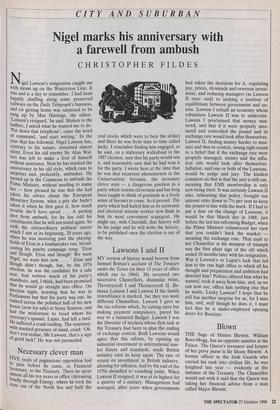Lawsons I and II
MY version of history would borrow from Samuel Brittan's account of The Treasury under the Tories (in their 13 years of office which ran to 1964). He invented two successive Chancellors, dissimilar twins, Thorneycroft I and Thorneycroft II. Be- tween Lawson I and Lawson II the family resemblance is marked, but they too were different Chancellors. Lawson I gave us the tax reforms which, by cutting rates but making payment compulsory, paved his way to a balanced Budget. Lawson I was the liberator of markets whose first task at the Treasury had been to plan the ending of exchange control. Both Lawsons would agree that this reform, by opening up industrial investment to international mar- ket forces and standards, made British industry earn its keep again. The rate of return on investment in British industry, allowing for inflation, had by the end of the 1970s dwindled to vanishing point. When Lawson II resigned, it was at its highest for a quarter of a century. Management had managed, after years when governments had taken the decisions for it, regulating pay, prices, dividends and overseas invest- ment, and reducing managers (as Lawson II once said) to seeking a position of equilibrium between government and un- ions. Lawson I rebuilt an economy whose robustness Lawson II was to underrate. Lawson I proclaimed that money mat- tered, and that if it were properly mea- sured and controlled the pound and its exchange rate would look after themselves. Lawson II, finding money harder to mea- sure and thus to control, swung right round to a belief that if the exchange rate were properly managed, money and the infla- tion rate would look after themselves. Inflation, said one or both of the Lawsons, would be judge and jury. The kindest comment on that is that the jury is still out, meaning that EMS membership is only now being tried. It was certainly Lawson II who, rehearsing that policy, brought our interest rates down to 71/2 per cent to keep the pound in line with the mark. If I had to put a date on the change of Lawsons, it would be that March day in 1988, just before the last tax-reforming Budget, when the Prime Minister volunteered her view that you couldn't buck the market meaning the exchange rate. That snub to her Chancellor at his moment of triumph was the first plain sign of the rift which ended 18 months later with his resignation. Was it Lawson's or Lupin's luck that led him to the one high office to which all his thought and preparation and ambition had directed him? Politics offered him what he wanted, took it away from him, and, as we can now see, offers him nothing else that he wants. Lucky Lawson? I hope that he still has another surprise for us, for I miss him, and, well though he does it, I must feel that he is under-employed opening doors for Barclays.


































































 Previous page
Previous page